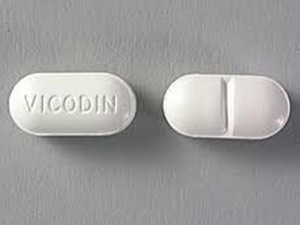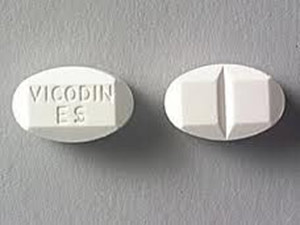Buy Vicodin Online
Showing all 2 results
What is Vicodin?
Vicodin is a combination medicine that contains acetaminophen and hydrocodone. You can buy Vicodin online in tablet form from a good online pharmacy like ours. Both its components have their different functions: Hydrocodone: It is an opioid medication that is sometimes known as a narcotic. Acetaminophen: It is a less potent opioid that changes how your body feels and responds to pain. Vicodin generic is available with the name of its components separately. You can order Vicodin online for pain treatment. Pain can be of various types, including chronic, acute, nociceptive, neuropathic, and radicular pain. It primarily acts on severe pain due to any medical condition. Our pharmacy offers Vicodin on sale along with several other pain medications. Our pharmacy even provides Vicodin overnight delivery, and you may compare the rate and discounts at which the medicine is available at different sites.
Primary Uses
Vicodin helps treat or offer relief from moderate to severe levels of pain. Hydrocodone is one of the most potent opioid drugs, while Acetaminophen or paracetamol is a comparatively less powerful pain reliever drug that increases the hydrocodone effects. Vicodin helps treat moderate to moderately severe pain. Due to the effectiveness of Vicodin and its immediate pain-relieving effect, people prefer taking it right away as the pain strikes. Our website provides Vicodin overnight delivery or same-day delivery for the convenience of the customers.
Important Information
Severe allergic reaction warning: Vicodin may cause an extreme and potentially threatening allergic reaction. The reaction may occur very rapidly, and the symptoms may include:
- Rash, itching
- Trouble breathing, vomiting
- Swelling of your throat, face, and mouth
If an allergic reaction occurs, you need to stop taking Vicodin and call your medical healthcare provider or get medical help right away. Vicodin may also cause adrenal gland problems that obstruct the proper functioning of your body.
Symptoms may include:
- Vomiting, nausea, loss of appetite
- Weakness or tiredness
- Dizziness, or lightheadedness
What Should I Do Before Using Vicodin?
You should avoid taking Vicodin if you are allergic to Vicodin, acetaminophen (Tylenol), or hydrocodone, or if you were recently using sedatives, alcohol, tranquilizers, or other narcotic medications. Ensure that your medical healthcare provider knows if you are using any medication for:
- Asthma (severe) or breathing problems; or
- Blockage in the stomach or intestines
To ensure Vicodin is safe on you, share your medical history with your medical healthcare provider, especially if you have ever had:
- Liver disease;
- Sleep apnea, breathing problems;
- Kidney disease;
- A drug or alcohol addiction;
- Urination problems;
- A head injury or seizures; or
- Problems with your pancreas, thyroid, or gallbladder
How Should I Take Vicodin?
We do not guarantee to provide information regarding all the possible drug forms and dosages here. But in general, we request you to take Vicodin precisely as per the dosing schedule, and strength your medical healthcare provider prescribed. Vicodin is beneficial as both a short-term and long-term treatment, but it comes with risks if you fail to take it according to the prescription. If you do not take this medication or stop taking it, your pain will persist and might worsen; it can even cause unpleasant Vicodin withdrawal symptoms. If you miss various doses or do not take the medication on schedule, your medicine might not provide you maximum relief or stop working altogether. If you take this medicine excessively, you can face a dangerous Vicodin overdose and even cause death.
Overdose symptoms may include:
- Nausea and vomiting
- An overall feeling of fatigue
- Sweating
- Slow heart rate
- Gradual reduction and suddenly stopped breathing.
- Low blood pressure
- Possible coma
- Liver damage or failure
What Should I Avoid While Taking Vicodin?
Vicodin may cause impairment in your thinking or reactions. Avoid driving any vehicle or operating any heavy machinery until you know this medicine’s effect on you. Severe drowsiness or dizziness can cause accidental falls or injuries. Ask a medical health care provider before using any other allergy, cold, pain, or sleep medication. Acetaminophen (APAP) is available in many combination medicines. It can lead to a fatal overdose. Check the label before buying any medicine for cold, allergy, pain, or sleep. Avoid the consumption of alcohol because it may increase your liver damage risk while using Acetaminophen.
What are the Side Effects of Vicodin?
Allergic reaction: Signs to an opioid, including Vicodin, in particular, may include trouble breathing, hives, and swelling of your face, throat, lips, or tongue. Opioid medicines like Vicodin can slow down or stop your breathing and cause death. Your caregiver or attendant should give you naloxone and call for medical help if you are hard to wake up, have blue-colored lips, or have slow breathing with long pauses. In rare cases, Acetaminophen can cause a skin reaction (severe) that can be fatal. Stop using Vicodin and call your health care professional immediately if you have a rash or skin redness that spreads and causes blistering and peeling. If this happens, you should never retake Acetaminophen.
Severe Vicodin side effects may include:
- A light-headed feeling;
- Sighing, noisy breathing, sleep apnea, shallow breathing;
- Seizures (or convulsions);
- Unusual behavior or thoughts, confusion;
- Missed menstrual periods, infertility;
- Easy bruising or bleeding;
- Sexual issues, impotence, loss of interest in sex;
- Low cortisol levels- worsening weakness or tiredness, vomiting, loss of appetite, dizziness, nausea;
- Liver problems- yellowing of eyes or skin, dark urine, clay-colored stools, loss of appetite, itching, nausea, upper stomach pain; or
- High serotonin levels in the body- diarrhea, vomiting, nausea, loss of coordination, twitching, muscle stiffness, rapid heart rate, shivering, sweating, agitation, fever, hallucinations
Severe breathing problems and attacks are more likely to occur in older adults and malnourished people with wasting syndrome or chronic breathing disorders.
Common side effects of Vicodin:
- Dry mouth;
- Blurred vision;
- Headache, drowsiness; or
- Upset stomach, constipation
What drugs can interact with Vicodin?
Vicodin can cause interaction with other drugs, herbs, or vitamins you may be taking. An exchange may change the way any medication works and cause dangerous effects on your health. To help avoid any such interactions, ensure that your medical healthcare provider manages all your medications carefully. Following are some of the drugs that can interact with the combination of Acetaminophen and hydrocodone:
Medications that cause drowsiness
Taking specific medications with Vicodin increases the risk of dizziness, drowsiness, and tiredness with reduced physical and mental function. If you need to take any of the following medicines with Vicodin, talk to your doctor first.
Examples may include:
- Other opioids
- Antihistamines, for allergies
- Antipsychotics that help treat schizophrenia, bipolar disorder, or depression.
- Benzodiazepines help treat anxiety.
Drugs that increase serotonin
Taking Vicodin with medications that increase the amount of the chemical serotonin in the body can cause some severe health issues.
Serotonin syndrome can be fatal, so avoid taking the following medications with Vicodin:
- Specific drugs for migraine (triptans)
- Certain medicines for nausea, such as ondansetron
- Tramadol, an opioid pain medication
- Linezolid, an antibiotic
Drugs that inhibit the activity of specific liver enzymes
Interaction of Vicodin with drugs that inhibit the functioning of specific liver enzymes can increase the hydrocodone amount in the body and result in more side effects. With this interaction, you may face a sudden increase in breathing problems or drowsiness.
Examples may include:
- Ketoconazole
- Erythromycin
- Protease inhibitors that help treat HIV, such as ritonavir.
Drugs that increase the activity of specific liver enzymes
Taking this drug with specific other medications can lower the amount of Acetaminophen or hydrocodone in the body. You may need a higher amount of Vicodin to control your pain.
Examples may include:
- Carbamazepine
- Rifampin
- Phenytoin
Further details
Here are some specific Vicodin dosage details for the adult patients (ages 18 years or more and weighing at least 101 pounds or 46 kg) along with the severity of pain:
- Hydrocodone: 5 mg or 2.5 mg/acetaminophen: 300 mg or 325 mg- The standard dose is one to two tablets every 4 to 6 hours as required. The maximum Vicodin amount should not exceed eight pills a day.
- Hydrocodone: 7.5 mg or 10 mg/acetaminophen: 300 mg or 325 mg- The usual dose is one tablet in 4 to 6 hours as required for pain relief. The maximum amount of this combination drug should not exceed six tablets per day.


